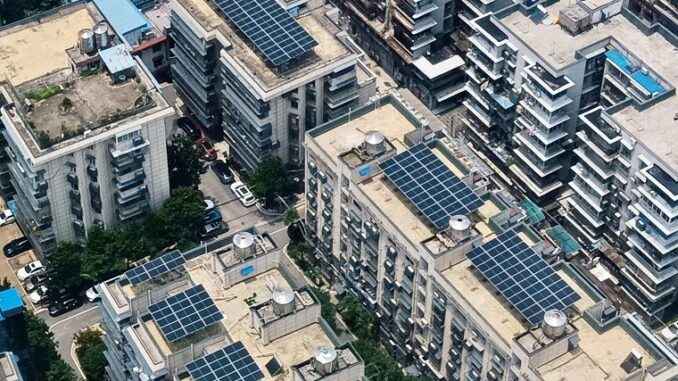
A rooftop solar project in China suggests community emissions-reduction work must benefit everybody to succeed.
China’s housing regulations are such that the roof of an apartment block is communally owned by all residents. That means there must be unanimous agreement to install solar panels there, making this a far more complicated undertaking than doing the same atop a public, commercial or agricultural building.
The Jianshe apartment complex in Wuhan’s Beihu subdistrict is a striking juxtaposition of the old and the new. These buildings in central China are of varying heights and some date back to 1987. Three are dotted with solar panels that together cover about 550 square metres – the size of a basketball court.
Unlike a new apartment complex with pre-installed rooftop solar, the Jianshe community had to navigate bringing all residents on side. This proved especially tricky because there are currently few examples of new, successful rooftop installations on old buildings.
So far, the 126-kilowatt installation powers amenities including hallway lighting, street lights and LED displays. The plan is to also hook up 19 electric-vehicle chargers, four “smart waste” receptacles and a charging dock for electric bikes.
The Jianshe management body has overseen the installation itself, meaning the power is used in-house and any surplus can be sold back to the grid.
The project has benefitted from the support of a global mayoral network called C40 Cities, which this author works for, as well as the local authorities of both Wuhan and Beihu.
The complex is almost carbon-neutral, but the panels haven’t just cut carbon emissions. They have provided sheltered areas in communal rooftop spaces, among other benefits. The arrangement has worked for the community, individual residents, and the solar-power firm involved. Other old apartment complexes could benefit from similar arrangements, people involved in the project have told Dialogue Earth.
How does it all work?
Jianshe’s residents have assigned their rooftop-usage rights to an external solar-power company. It is responsible for funding, operating and maintaining the panels, and selling the generated electricity at a profit. In return, the Jianshe management body gets electricity at half the commercial rate – CNY 0.50 per kilowatt hour – lowering the residents’ service charge.
“The rooftop solar means we’re not paying for communal electricity use,” says resident Wang Shufang. “We’ve got more amenities in the community, and the rooftop spaces are more pleasant.” (Image: Beihu Subdistrict Office)
This saves Jianshe almost CNY 50,000 (USD 6,900) annually, which goes into a communal fund dedicated to solar-powered lights, rainwater-collection equipment and planters for a rooftop garden. The solar panels also help keep the rooftops cool and dry – another advantage for the residents, who use them as a communal space. “The rooftop solar means we’re not paying for communal electricity use,” says resident Wang Shufang. “We’ve got more amenities in the community, and the rooftop spaces are more pleasant.”
The panels are managed by Fengmai Energy, which says Jianshe generated 76,300 kilowatt hours of solar power in the 12 months from early April 2023. In other words, the apartment complex avoided indirectly emitting 99.3 tonnes of carbon dioxide and 12.1 tonnes of ash, according to the company. Assuming a 25-year lifespan, the installation will generate a total of 2.5 million kilowatt-hours of electricity and avoid burning 744.8 tonnes of coal, states the company.
Read full article at link below.
Source: Dialogue Earth, June 26, 2024. https://dialogue.earth/en/energy/opinion-wuhan-residents-pioneer-a-winning-formula-for-rooftop-solar/